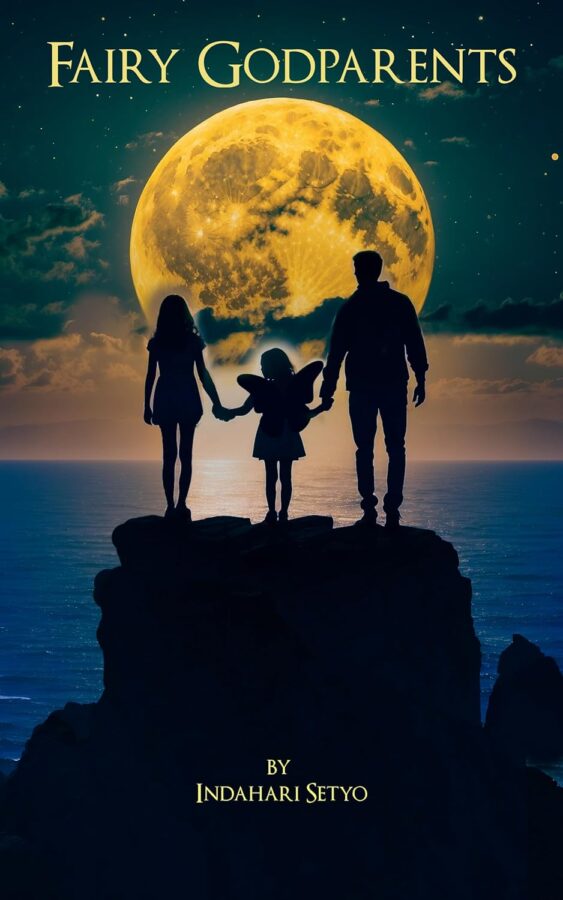Genre: Fantasy, Science Fiction
Reviewer: Beàta
Get It On Amazon
About The Book
Shaun and Thisbe stumble upon an abandoned baby while hiking. Is little Stella a gift from the fairies as Thisbe believes? Or are her supernatural experiences just a part of the virtual reality that Shaun is designing? What if Stella is actually the beautiful instrument of divine judgment?
It’s not easy to raise a fairy child, especially when a fiendish creature is scheming to use her to access the human realm, and an evil corporation wants to exploit her memories.
Can Shaun and Thisbe help little Stella find her destiny in time to save their family, and maybe the world too? Or will the Angel’s Curse force Stella to make a choice that none of them could have imagined?
The Review
One day, while hiking, software engineer Shaun and his wife Thisbe find a newborn baby. As the mother can’t be found, they adopt her.
When their daughter Stella is a little older, the question of who her birth mother is comes up unexpectedly. Not wanting to tell her that she has been abandoned, Thisbe panics and makes up a story about Stella being a fairy princess, a story she then doubles down on, until she has constructed an elaborate parallel reality for her.
Meanwhile, Shaun gets caught up in the virtual reality business. Questions soon arise about the ethics of his work, and the negative impact it has on his family, especially Stella. Shaun and Thisbe do everything in their power to protect their daughter from the virtual world, but in the process, they risk loosing touch with reality themselves.
This was a strange read, to put it mildly. In the foreword, the author mentions how this book doesn’t really fit into any genre, and they are absolutely correct. Fantasy, reality and science fiction mix in a unique and confusing way, until even the characters themselves aren’t sure any more what is real and what is the virtual reality generator. On top of this comes Stella’s childish innocence, and the fantasy world her mother is keeping her trapped in, and some religious symbolism that should or should not be taken literally. Nothing is clear.
What hit me the strongest, as a reader who is not from the USA, is just how very US-American this book is, and not in a good way. There is this way of seeing the world, and the people in it, that only makes sense if you are a conservative US American, and that is the way the characters in this book see it. Humanity in general is untrustworthy at best, a danger at worst, and the rise of virtual reality in the book is compared to biblical threats like the Whole of Babylon and the degeneracy preceding the Greet Flood. The solution to this is for the protagonists to retreat from society as much as possible, and focus on keeping their family safe.
It is all very strange, because they often think of the most extreme solutions first, and then their decision isn’t really questioned again, in universe or out. Like that time when Thisbe panics about Stella being subjected to virtual reality in kindergarten, and instead of asking if she could be excused from taking part in these programs – despite having a concrete, solid medical reason for her fear – she just gets her entire family to move to a secluded farm in the middle of nowhere. Or somewhat later, when they find evidence of a stranger lurking on their grounds, and their reaction is to buy some guns and spend all their savings installing a bunker, instead of, for example, alerting the sheriff.
At the point of writing this review, I have spent a good month and a half thinking about this book and the social and political views it represents, and I still can’t really wrap my head around it.
I don’t know if we are meant to agree with Shaun and Thisbe. I don’t know if we are supposed to sympathize with their actions. I don’t know if there is something marking this book as a parody somewhere, and I just missed it. As it is, I would say that they are proven right by everything that happens within the story.
As I said, strange reading experience. I am not sure, if I would recommend this book to anyone, like I am not sure about whether Fairyland exists or not. But it certainly was an interesting experience.
The Reviewer
Beáta Fülöp is an aspiring filmmaker and writer. She identifies as aromantic and asexual, and has an autistic Special Interest in the representation of minorities. One day, she will use this knowledge in her own stories. Until then, she is happy to sit here and give her opinion on other people’s hard work.


